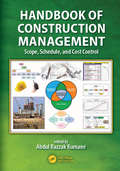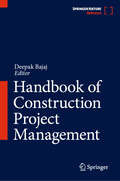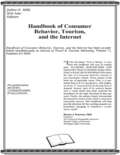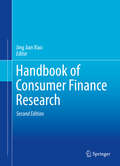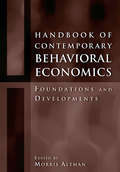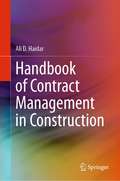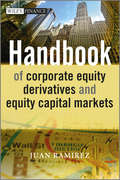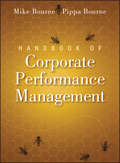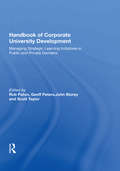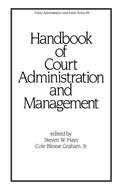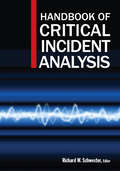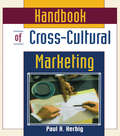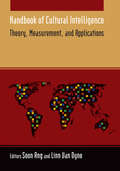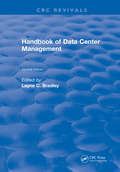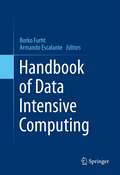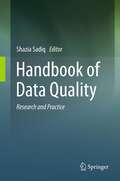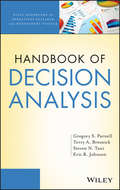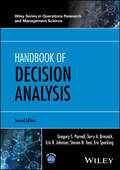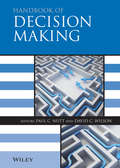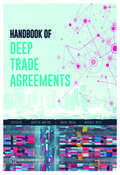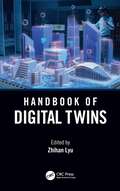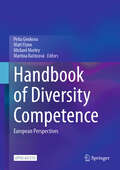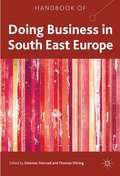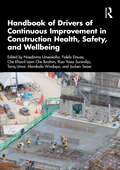- Table View
- List View
Handbook of Concierge Medical Practice Design
by Maria K. ToddIn concierge medicine, physicians develop amenities-rich membership programs and collect a monthly or annual membership fee to pay for the amenities in addition to the medical services rendered. Handbook of Concierge Medical Practice Design examines the many considerations physicians must make prior to transitioning their practices into concierge services. Maria K. Todd, a recognized expert in concierge medicine, branding, consulting, healthcare, marketing, medical tourism, planning, and physician practice administration, explains how to set up a concierge practice. She describes how this new business model affects workflow and outlines financial considerations including managed care payer relations, the hybrid practice, and predictive modeling to uncover the hidden factors that affect bottom-line performance. The book supplies readers with models for creating a business plan and a strategy for transforming a practice into a concierge practice. It concludes by covering the legal aspects of creating a concierge practice. It includes patient acquisition and retention strategies as well as detailed plans for adding additional doctors and physician extenders, such as nurse practitioners and physician assistants.The book provides sample employment contracts and advice on how to select and work with consultants. It includes chapters on business process re-engineering, workflow management, financial considerations, competitive analysis, developing a business plan, and how to market the new practice.
Handbook of Construction Management: Scope, Schedule, and Cost Control (Systems Innovation Book Series)
by Abdul Razzak RumaneThe book is developed to provide significant information and guidelines to construction and project management professionals (owners, designers, consultants, construction managers, project managers, supervisors, contractors, builders, developers, and many others from the construction-related industry) involved in construction projects (mainly civil construction projects, commercial-A/E projects) and construction-related industries. It covers the importance of construction management principles, procedures, concepts, methods, and tools, and their applications to various activities/components/subsystems of different phases of the life cycle of a construction project. These applications will improve the construction process in order to conveniently manage the project and make the project most qualitative, competitive, and economical. It also discuss the interaction and/or combination among some of the activities/elements of management functions, management processes, and their effective implementation and applications that are essential throughout the life cycle of project to conveniently manage the project. This handbook will: Focus on the construction management system to manage construction projects Include a number of figures and tables which will enhance reader comprehension Provide all related topics/areas of construction management Be of interest to all those involved in construction management and project management Provide information about Building Information Modeling (BIM), and ISO Certification in Construction Industry Offer a chapter on Lean construction The construction project life cycle phases and its activities/elements/subsystems are comprehensively developed and take into consideration Henri Fayol's Management Function concept which was subsequently modified by Koontz and O'Donnel and Management Processes Knowledge Areas described in PMBOK® published by Project Management Institute (PMI). The information available in the book will also prove valuable for academics/instructors to provide construction management/project management students with in-depth knowledge and guidelines followed in the construction projects and familiarize them with construction management practices.
Handbook of Construction Project Management
by Deepak BajajThis handbook is designed to serve as a comprehensive guide tailored to managing construction projects within the unorganized sector, which is often characterized by small-scale, informal operations that lack structured management practices. This handbook places a special emphasis on emerging economies, where the unorganized sector plays a significant role in the construction industry. This book aims to provide a robust foundation in construction project management by covering essential principles and practices necessary for effective project management. It focuses on offering practical solutions and strategies to improve project delivery, cost management, and operational efficiency within the unorganized sector. Additionally, the book emphasizes sustainability and the integration of innovative technologies, promoting green practices and digital transformation. By adopting a holistic approach, it incorporates socioeconomic considerations, stakeholder engagement, and capacity building to foster improvements across the sector. Real-world case studies and examples are included to illustrate the successful application of various methodologies and highlight lessons learned. Content from this book can also be used to supplement classroom teaching for courses related construction project management and the building construction profession aimed and practicing building engineers, construction professionals and even architects. The contents of this book will be useful to researchers, academics, and practitioners alike.
Handbook of Consumer Behavior, Tourism, and the Internet
by Juline Mills Rob LawMake the most of your online business resources The growing acceptance and use of the Internet as an increasingly valuable travel tool has tourism and hospitality businesses taking a critical look at their business-to-customer online environments while pondering such questions as, "How do I get people to visit my Web site?" "Is my Web site attracting the &’right&’ kind of e-consumers?" and "How do I turn browsers into buyers?" The Handbook of Consumer Behavior, Tourism, and the Internet analyzes the latest strategies involving Internet business applications that will help you attract-and keep-online travel customers. Researchers from the United States, Europe, and Asia present the latest findings you need to make the right decisions regarding long-term e-commerce development and planning.The Handbook of Consumer Behavior, Tourism, and the Internet examines vital issues affecting the travel and tourism industry from an online perspective. This book analyzes the latest theory and research on general online buyer characteristics, the differences between online and offline consumer behavior, the differences between broadband and narrowband users, the online search process, quality and perception of lodging brands, and Web site design, maintenance, and development. Each section of the book includes a model/diagram that serves as an overview of the topic, followed by a thorough discussion on the topic from several sources. Each section ends with commentary on the areas where future research is needed. The book&’s contributors use a variety of research methodologies ranging from qualitative data analyses using artificial neutral network analysis, to experimental design, non-parametric statistical tests, and structural equation modeling. Topics examined in the Handbook of Consumer Behavior, Tourism, and the Internet include: the need for businesses to use internal examinations to determine and meet online consumer needs the emerging field of e-complaint behavior-consumers taking to the Web to voice complaints about travel services how to use e-tools to measure guest satisfaction how to measure consumer reaction to Web-based technology the Internet&’s impact on decision making for travel products and how to use e-mail marketing, electronic customer relationship management (eCRM), Web positioning, and search engine placementThe Handbook of Consumer Behavior, Tourism, and the Internet is equally valuable as a classroom resource or professional reference, providing up-to-date material on Internet applications and their impact on consumers and e-commerce.
Handbook of Consumer Finance Research
by Jing Jian XiaoThis second edition of the authoritative resource summarizes the state of consumer finance research across disciplines for expert findings on--and strategies for enhancing--consumers' economic health. New and revised chapters offer current research insights into familiar concepts (retirement saving, bankruptcy, marriage and finance) as well as the latest findings in emerging areas, including healthcare costs, online shopping, financial therapy, and the neuroscience behind buyer behavior. The expanded coverage also reviews economic challenges of diverse populations such as ethnic groups, youth, older adults, and entrepreneurs, reflecting the ubiquity of monetary issues and concerns. Underlying all chapters is the increasing importance of financial literacy training and other large-scale interventions in an era of economic transition. Among the topics covered: Consumer financial capability and well-being. Advancing financial literacy education using a framework for evaluation. Financial coaching: defining an emerging field. Consumer finance of low-income families. Financial parenting: promoting financial self-reliance of young consumers. Financial sustainability and personal finance education. Accessibly written for researchers and practitioners, this Second Edition of the Handbook of Consumer Finance Research will interest professionals involved in improving consumers' fiscal competence. It also makes a worthwhile text for graduate and advanced undergraduate courses in economics, family and consumer studies, and related fields.
Handbook of Contemporary Behavioral Economics: Foundations and Developments
by Morris AltmanAt a time when both scholars and the public demand explanations and answers to key economic problems that conventional approaches have failed to resolve, this groundbreaking handbook of original works by leading behavioral economists offers the first comprehensive articulation of behavioral economics theory. Borrowing from the findings of psychologists, sociologists, political scientists, legal scholars, and biologists, among others, behavioral economists find that intelligent individuals often tend not to behave as effectively or efficiently in their economic decisions as long held by conventional wisdom. The manner in which individuals actually do behave critically depends on psychological, institutional, cultural, and even biological considerations. "Handbook of Contemporary Behavioral Economics" includes coverage of such critical areas as the Economic Agent, Context and Modeling, Decision Making, Experiments and Implications, Labor Issues, Household and Family Issues, Life and Death, Taxation, Ethical Investment and Tipping, and Behavioral Law and Macroeconomics. Each contribution includes an extensive bibliography.
Handbook of Contract Management in Construction
by Ali D. HaidarThis book addresses the process and principles of contract management in construction from an international perspective. It presents a well-structured, in-depth analysis of construction law doctrines necessary to understand the fundamentals of contract management. The book begins with an introduction to contract management and contract law and formation. It then discusses the various parties to a contract and their relevant obligations, whether they are engineers, contractors or subcontractors. It also addresses standard practices when drafting and revising contracts, as well as what can be expected in standard contracts general clauses. Two chapters are dedicated to contract clauses, with one focused on contract administration such as schedules, payment certificates and defects liability, and the other focused on contract management, such as terminations, dispute resolutions and claims. This book provides a useful reference to engineers, project managers and students within the field of engineering and construction management.
Handbook of Corporate Equity Derivatives and Equity Capital Markets
by Juan RamirezEquity strategies are closely guarded secrets and as such, there is very little written about how investors and corporate can utilise equity vehicles as part of their growth strategies. In this much-needed book, industry expert Juan Ramiraz guides readers through the whole range of equity derivative instruments, showing how they can be applied to a range of equity capital market situations, including hedging, yield enhancement and disposal of strategic stakes, mergers and acquisitions, stock options plan hedging, equity financings, share buybacks and other transactions on treasury shares, bank regulatory capital arbitrage and tax driven situations. The book includes case studies to highlight how equity derivative strategies have been used in real-life situations.
Handbook of Corporate Performance Management
by Pippa Bourne Mike BourneA corporate performance management system can transform your business - but only if it is designed and implemented in the right way. this book will provide you with the tools and approaches to help translate your strategy into action and make you aware of the pitfalls to be avoided.The Handbook of Corporate Performance Management takes a practical approach, offering guidance on what works, tools to use, and how leadership makes an essential contribution to success.THE BOOK IS BROADLY DIVIDED INTO FOUR SECTIONS:Section One Provides the essential toolkit for setting up and implementing a corporate performance management system. It covers the processes and approaches you need to make it work.Section two explains how you can use performance management to manage your business from tracking performance through the management review process to checking whether your strategy is still appropriate.Section three provides guidance for measuring specific key areas; financial performance, staff performance, customers, processes, competence and resource development, and sustainability.Section four is about bringing it all together. Case studies of individuals from widely differing organisations, who have all delivered great results, illustrate the importance of good leadership in creating a culture of high performance.The Handbook of Corporate Performance Management is the essential guide to using performance measurement and management to get the best out of your business.
Handbook of Corporate University Development: Managing Strategic Learning Initiatives in Public and Private Domains
by Geoff PetersFrom the moment the first corporate university (CU) was created and the term was coined, the central metaphor of university has proved a double-edged sword. The emphasis on university has been a driving force in moving companies beyond a restricted and siloed approach to training, to a central vision for learning within the organization. On the other hand, there have been failures and many corporate universities have struggled to bring a business rigour to learning or to align their development with the key business and financial drivers of the organization. Handbook of Corporate University Development draws on experience from around the world, to provide anyone responsible for strategy and learning - at senior levels in government, education and business - with a picture of current best practice. The Handbook is not a prescriptive 'how-to', rather an exploration of key issues such as: � Who owns a corporate university initiative? � How is the funding managed? � How is the CU aligned with business strategy? � How do CU directors and project managers deploy resources? � How do they deal with suppliers? � How do they report and measure CU performance? � What are the processes and technologies needed to provide and support different forms of learning? � How can you blend different media? � How do you assess what learning has taken place? � What are the future prospects and potential for corporate universities? It is time for the corporate university to demonstrate how business rigour, handled deftly and with strong and perceptive leadership, can revolutionize learning both inside and outside the organization. Handbook of Corporate University Development is an important catalyst towards this process.
Handbook of Court Administration and Management (Public Administration And Public Policy Ser. #49)
by HaysBlending both the theoretical and applied aspects of contemporary issues in court management, this reference/text offers in-depth coverage of all major topics and developments in judicial systems administration. It is suitable for use in the classroom or for self-study.;Providing the background material to clarify even the most technical management application, this book: presents the history and theory of the court management movement; examines the separation of powers doctrine, and its relationship to judicial independence; discusses the latest developments in court reform, the American Bar Association standards, alternative dispute resolution techniques and caseflow considerations; analyzes unified court budgeting and revenue generation by judicial systems; describes personnel administration, training and jury management; and elucidates court performance evaluation, planning approaches, the use of cameras in the courtroom and audio-visual applications.
Handbook of Critical Incident Analysis
by Richard W SchwesterCritical incidents all too often explode onto the social conscious and challenge our sense of security. This comprehensive handbook brings together a range of experts who provide a foundation for the field of critical incident analysis by examining specific incidents9/11, the Virginia Tech massacre, the H1N1 pandemic, the BP oil spill, and more--through various methodological and disciplinary lenses.
Handbook of Cross-Cultural Marketing
by Erdener Kaynak Paul HerbigGoing global can be risky business if you don't divest yourself of your ethnocentric thinking. You have to take into consideration your new market's language, work schedules, tastes, lifestyle choices, and cultural associations, and this is the book to help you do that! Handbook of Cross-Cultural Marketing shows you how to sensitize your marketing approaches to the cultural norms and taboos of other societies, as well as the importance of demonstrating an interest in and appreciation of different cultures.Designed to assist both American and foreign companies, Handbook of Cross-Cultural Marketing shows you how to increase your chance at success in international markets. It identifies and explains ten important aspects of culture that are essential to cross-cultural marketing to help you understand how underlying cultural beliefs govern the way marketing functions in different societies. It also gives you specific steps for developing cultural adaptation strategies in international marketing. To further your understanding of global marketing and fundamental marketing concepts, this comprehensive book discusses:real life examples of company successes and failures abroadattitudes toward middlemen in underdeveloped countriesthe advantages of foreign trade showslocating and using representatives, agents, and/or distributors in foreign countriesthe reception of different American products in different countriespotential cultural pitfalls of primary data collecting techniquesthe role of time in various culturessetting standards for product performanceA useful text for students and practitioners alike, Handbook of Cross-Cultural Marketing gives you hands-on strategies and advice for delving into different markets, using techniques that are respectful of individual cultures, and avoiding unnecessary mistakes that can occur if you don't take the initiative to get to know the culture of your new marketplace. Your outlook and beliefs are not the global norm, so read this book to find out how you can be successful with customers who are different from you in terms of motivation, values, beliefs, and outlook.
Handbook of Cultural Intelligence: Theory, Measurement, and Applications
by Soon Ang Linn Van DyneCultural intelligence is defined as an individual's ability to function effectively in situations characterized by cultural diversity. With contributions from eminent scholars worldwide, the "Handbook of Cultural Intelligence" is a 'state-of-the-science' summary of the body of knowledge about cultural intelligence and its relevance for managing diversity both within and across cultures. Because cultural intelligence capabilities can be enhanced through education and experience, this handbook emphasizes individual capabilities - specific characteristics that allow people to function effectively in culturally diverse settings - rather than the approach used by more traditional books of describing and comparing cultures based on national cultural norms, beliefs, habits, and practices.The Handbook covers conceptional and definitional issues, assessment approaches, and application of cultural intelligence in the domains of international and cross-cultural management as well as management of domestic activity. It is an invaluable resource that will stimulate and guide future research on this important topic and its application across a broad range of disciplines, including management, organizational behavior, industrial and organizational psychology, intercultural communication, and more.
Handbook of Data Center Management: Second Edition (CRC Press Revivals)
by Layne C. BradleyAccounting for the rapid and often confusing changes currently underway in the information systems of organizations, such as the rush to replace mainframes with networks and the decentralization of data storage and processing, provides insights on the duties and challenges of a data center manager. Covers strategic planning, management practices, controls, systems and contingency planning, network technology, human resources, desktop computing, and future directions....
Handbook of Data Intensive Computing
by Borko Furht Armando EscalanteData Intensive Computing refers to capturing, managing, analyzing, and understanding data at volumes and rates that push the frontiers of current technologies. The challenge of data intensive computing is to provide the hardware architectures and related software systems and techniques which are capable of transforming ultra-large data into valuable knowledge. Handbook of Data Intensive Computing is written by leading international experts in the field. Experts from academia, research laboratories and private industry address both theory and application. Data intensive computing demands a fundamentally different set of principles than mainstream computing. Data-intensive applications typically are well suited for large-scale parallelism over the data and also require an extremely high degree of fault-tolerance, reliability, and availability. Real-world examples are provided throughout the book. Handbook of Data Intensive Computing is designed as a reference for practitioners and researchers, including programmers, computer and system infrastructure designers, and developers. This book can also be beneficial for business managers, entrepreneurs, and investors.
Handbook of Data Quality: Research and Practice
by Shazia SadiqThe issue of data quality is as old as data itself. However, the proliferation of diverse, large-scale and often publically available data on the Web has increased the risk of poor data quality and misleading data interpretations. On the other hand, data is now exposed at a much more strategic level e.g. through business intelligence systems, increasing manifold the stakes involved for individuals, corporations as well as government agencies. There, the lack of knowledge about data accuracy, currency or completeness can have erroneous and even catastrophic results. With these changes, traditional approaches to data management in general, and data quality control specifically, are challenged. There is an evident need to incorporate data quality considerations into the whole data cycle, encompassing managerial/governance as well as technical aspects. Data quality experts from research and industry agree that a unified framework for data quality management should bring together organizational, architectural and computational approaches. Accordingly, Sadiq structured this handbook in four parts: Part I is on organizational solutions, i.e. the development of data quality objectives for the organization, and the development of strategies to establish roles, processes, policies, and standards required to manage and ensure data quality. Part II, on architectural solutions, covers the technology landscape required to deploy developed data quality management processes, standards and policies. Part III, on computational solutions, presents effective and efficient tools and techniques related to record linkage, lineage and provenance, data uncertainty, and advanced integrity constraints. Finally, Part IV is devoted to case studies of successful data quality initiatives that highlight the various aspects of data quality in action. The individual chapters present both an overview of the respective topic in terms of historical research and/or practice and state of the art, as well as specific techniques, methodologies and frameworks developed by the individual contributors. Researchers and students of computer science, information systems, or business management as well as data professionals and practitioners will benefit most from this handbook by not only focusing on the various sections relevant to their research area or particular practical work, but by also studying chapters that they may initially consider not to be directly relevant to them, as there they will learn about new perspectives and approaches.
Handbook of Decision Analysis
by Gregory S. Parnell Eric R. Johnson Terry Bresnick Steven N. TaniA ONE-OF-A-KIND GUIDE TO THE BEST PRACTICES IN DECISION ANALYSISDecision analysis provides powerful tools for addressing complex decisions that involve uncertainty and multiple objectives, yet most training materials on the subject overlook the soft skills that are essential for success in the field. This unique resource fills this gap in the decision analysis literature and features both soft personal/interpersonal skills and the hard technical skills involving mathematics and modeling.Readers will learn how to identify and overcome the numerous challenges of decision making, choose the appropriate decision process, lead and manage teams, and create value for their organization. Performing modeling analysis, assessing risk, and implementing decisions are also addressed throughout. Additional features include:Key insights gleaned from decision analysis applications and behavioral decision analysis researchIntegrated coverage of the techniques of single- and multiple-objective decision analysisMultiple qualitative and quantitative techniques presented for each key decision analysis taskThree substantive real-world case studies illustrating diverse strategies for dealing with the challenges of decision makingExtensive references for mathematical proofs and advanced topicsThe Handbook of Decision Analysis is an essential reference for academics and practitioners in various fields including business, operations research, engineering, and science. The book also serves as a supplement for courses at the upper-undergraduate and graduate levels.
Handbook of Decision Analysis (Wiley Series in Operations Research and Management Science)
by Gregory S. Parnell Eric R. Johnson Steven N. Tani Terry A. Bresnick Eric SpeckingQualitative and quantitative techniques to apply decision analysis to real-world decision problems, supported by sound mathematics, best practices, soft skills, and more With substantive illustrations based on the authors’ personal experiences throughout, Handbook of Decision Analysis describes the philosophy, knowledge, science, and art of decision analysis. Key insights from decision analysis applications and behavioral decision analysis research are presented, and numerous decision analysis textbooks, technical books, and research papers are referenced for comprehensive coverage. This book does not introduce new decision analysis mathematical theory, but rather ensures the reader can understand and use the most common mathematics and best practices, allowing them to apply rigorous decision analysis with confidence. The material is supported by examples and solution steps using Microsoft Excel and includes many challenging real-world problems. Given the increase in the availability of data due to the development of products that deliver huge amounts of data, and the development of data science techniques and academic programs, a new theme of this Second Edition is the use of decision analysis techniques with big data and data analytics. Written by a team of highly qualified professionals and academics, Handbook of Decision Analysis includes information on: Behavioral decision-making insights, decision framing opportunities, collaboration with stakeholders, information assessment, and decision analysis modeling techniques Principles of value creation through designing alternatives, clear value/risk tradeoffs, and decision implementation Qualitative and quantitative techniques for each key decision analysis task, as opposed to presenting one technique for all decisions. Stakeholder analysis, decision hierarchies, and influence diagrams to frame descriptive, predictive, and prescriptive analytics decision problems to ensure implementation success Handbook of Decision Analysis is a highly valuable textbook, reference, and/or refresher for students and decision professionals in business, management science, engineering, engineering management, operations management, mathematics, and statistics who want to increase the breadth and depth of their technical and soft skills for success when faced with a professional or personal decision.
Handbook of Decision Making
by Paul C. Nutt David C. WilsonWiley's new Handbook of Decision Making is a vital reference text for all students and professionals of management, organization and decision making. The handbook offers a wide range of theoretical and empirical approaches to the understanding of organizational and strategic decisions. Contributors are internationally known experts drawn from North America, Canada and Europe who have spent many years in the study of decision making, and decision making relevant topics. We believe the handbook will become a tour de force in the understanding decision making, offering a wide variety of perspectives, topics, and summative understanding of the field. Chapters in the Handbook were prepared by the leading experts in their field and include cutting edge empirical, theoretical, and review chapters. The chapters bring together for the first time a critical mass of writing on decision making as an organizational and research activity. The Editors are two of the leading international experts in decision making and contribute to the Handbook with five original Chapters that offer an appraisal of the field and suggestions for research, as well as the current status of decision making practice and suggestion for improvement.
Handbook of Deep Trade Agreements
by Aaditya Mattoo, Nadia Rocha, and Michele RutaDeep trade agreements (DTAs) cover not just trade but additional policy areas, such as international flows of investment and labor and the protection of intellectual property rights and the environment. Their goal is integration beyond trade or deep integration. These agreements matter for economic development. Their rules influence how countries (and hence, the people and firms that live and operate within them) transact, invest, work, and ultimately, develop. Trade and investment regimes determine the extent of economic integration, competition rules affect economic efficiency, intellectual property rights matter for innovation, and environmental and labor rules contribute to environmental and social outcomes. This Handbook provides the tools and data needed to analyze these new dimensions of integration and to assess the content and consequences of DTAs. The Handbook and the accompanying database are the result of collaboration between experts in different policy areas from academia and other international organizations, including the International Trade Centre (ITC), Organisation for Economic Co-operation and Development (OECD), United Nations Conference on Trade and Development (UNCTAD), and World Trade Organization (WTO).
Handbook of Digital Twins
by Zhihan LyuOver the last two decades, Digital Twins (DTs) have become the intelligent representation of future development in industrial production and daily life. Consisting of over 50 chapters by more than 100 contributors, this comprehensive handbook explains the concept, architecture, design specification and application scenarios of DTs.As a virtual model of a process, product or service to pair the virtual and physical worlds, DTs allow data analysis and system monitoring by using simulations. The fast-growing technology has been widely studied and developed in recent years. Featured with centralization, integrity and dynamics, it is cost-effective to drive innovation and performance. Many fields saw the adaptation and implementation across industrial production, healthcare, smart city, transportation and logistics. World-famous enterprises such as Siemens, Tesla, ANSYS and General Electric have built smart factories and pioneered digital production, heading towards Industry 4.0.This book aims to provide an in-depth understanding and reference of DTs to technical personnel in the field, students and scholars of related majors, and general readers interested in intelligent industrial manufacturing.
Handbook of Diversity Competence: European Perspectives
by Michael Morley Petia Genkova Matt Flynn Martina RašticováThis open access handbook provides the most current overview of the discussion on diversity competence, with a focus on Europe. Diversity competence has become a key area of interdisciplinary study because of the increasingly intercultural nature of institutions and organisations across the world. This important handbook reviews the conceptual and theoretical foundations of this concept and reflects on the scope of its application. It provides directions for further research in the theory, research and practice of diversity competence and includes country-wise perspectives as well. An international team of researchers brings together insights from research and best practice in psychology, cultural sciences, economics, pedagogical sciences, sociology, social work, medicine, theology, politics and law. This is an important resource for a wide readership of students, researchers and practitioners who research on or work with people from diverse cultures.
Handbook of Doing Business in South East Europe
by Dietmar Sternad Thomas D�ringA comprehensive insight into a region which is characterized by rapid economic and social changes with a significant rise in foreign direct investments and privatization. Analysis covers political, legal, economic and social trends,and topics such as the influence of informal networks and corruption, as well as cultural diversity.
Handbook of Drivers of Continuous Improvement in Construction Health, Safety, and Wellbeing
by Riza Yosia Sunindijo Fidelis Emuze Che Khairil Izam Che Ibrahim Abimbola Windapo Nnedinma Umeokafor Tariq Umar Jochen TeizerThis Handbook presents opportunities, best practices, and case studies backed by cutting edge research on the drivers of continuous improvement of health, safety, and wellbeing in the architecture, engineering, construction, and facility management sector. The book consists of 23 chapters with six themes covering:● Drivers of the business case for healthier and safer construction● Opportunities and drivers of digital technologies for improving health and safety ● Drivers of human factors for improving health and safety● Drivers of safer design and procurement ● Drivers of better health and wellbeing for construction.● Opportunities for driving equality and inclusivity for safer construction.The book will be beneficial to academics, undergraduate and postgraduate (research and taught) students, professional institutions (such as the Institution of Occupational Safety and Health), health and safety professionals (health and safety officers, consultants and managers), occupational health professionals, mental health and wellbeing professionals, construction managers, architects, project professionals, engineers (design, construction, project, site, electrical, mechanical, civil, building services, and structural), facilities managers, quantity surveyors, and site managers. The aim of the book is to provide critical perspectives alongside evidence based practical examples of success stories, that should inspire readers and engender continuous improvement in health, safety, and wellbeing in the construction industry.

